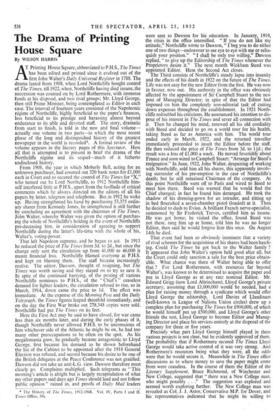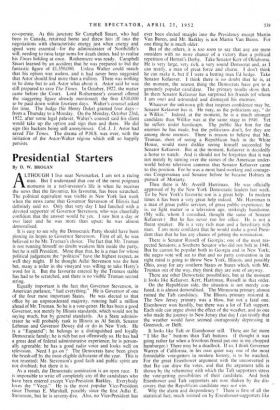The Drama of Printing House Square
By WILSON HARRIS
ATPrinting House Square, abbreviated to P.H.S., The Times has been edited and printed since it evolved out of the first John Walter's Daily Universal Register in 1788. The drama lasted from 1908, when Lord Northcliffe bought control of The Times, till 1922, when, Northcliffe having died insane, the succession was counted on by Lord Rothermere, with immense funds at his disposal, and two rival groups; Mr. Lloyd George, then still Prime Minister, being contemplated as Editor in each case. The interval of fourteen years consisted of the Napoleonic regime of Northcliffe, highly beneficial to the paper's finances, less beneficial to its prestige and harassing almost beyond endurance to its able and devoted staff. The story, dramatic from start to finish, is told in the new and final volume— actually one volume in two parts—in which the most recent phase of the long and distinguished history of the greatest newspaper in the world is recorded*. A formal review of the volume appears in the literary pages of this Spectator. Here all that is attempted is to present in brief the drama of the Northcliffe regime and its sequel—much of it hitherto undisclosed history.
From 1908, the year in which Moberly Bell, acting for an unknown purchaser, had counted out 320 bank notes for £1,000 each in Court and so secured the control of The Times for "X," who turned out be Lord Northcliffe, to 1912 Northcliffe him- self interfered little at P.H.S., apart from the fusillade of critical comments which he always directed on the editors of all his papers by letter, telegram and telephone. But in 1912 he woke up. Having strengthened his hand by purchasing 53,375 ordin- ary shares from Kennedy Jones, he strengthened it still further by concluding an agreement with the chairman of The Times, John Walter, whereby Walter was given the option of purchas- ing the whole of Northcliffe's holding in the event of Northcliffe pre-deceasing him, in consideration of agreeing to support Northcliffe during the latter's life-time with the whole of his, Walter's, voting-power. That left Napoleon supreme, and he began to act. In 1913 he reduced the price of The Times from 3d. to 2d., but since the change only sent the circulation up from 41,000 to 46,000 it meant financial loss. Northcliffe blained everyone at P.H.S. and kept on blaming them. The staff became increasingly restive. The editor, Dawson, thought of resigning, but The Times was worth saving and they stayed on to try to save it. In spite of the continued harrying, of the posting of various Northcliffe nominees to P.H.S., of the " Chief's " ceaseless demand for lighter leaders, the circulation refused to rise, so in March, 1914, down came the price to 1 d. The effect was immediate. At the expense of the Morning Post and the Daily Telegraph, the Times figures leaped threefold immediately, and on the day the First War broke out 278,348 copies were sold. Northcliffe had put The Times on its feet. Here the First Act may be said to have closed, for war came less than six months later, and during the early phases of it, though Northcliffe never allowed P.H.S. to be unconscious of him whichever side of the Atlantic he might be on, he had too many other_ preoccupations to be often on the spot. As his megalomania grew, he gradually became antagonistic to Lloyd George, first because his demand to be shown beforehand the list of the Cabinet to be appointed after the 1918 General Election was refused, and second because his desire to be one of the British delegates at the Peace Conference was not gratified. Dawson did not take an anti-L.G. view. Dawson therefore must clearly go. Complaints multiplied. Such telegrams as " This morning's article is alright but is largely recapitulation of what my other papers said days ago Times should lead and not follow public opinion " rained in, and proofs of Daily Mail leaders • The History of The Times, 1912-1948. Vol. IV, Parts 1 and IL Times Office, 50s. were sent to Dawson for his education. In January, 1919, the crisis in the office intensified. " If you do not like my attitude," Northcliffe wfote to Dawson, " I beg you to do either one of two things—endeavour to see eye to eye with me or relin- quish your position." " I shall be only too willing," Dawson replied, " to give up the Editorship of The Times whenever the Proprietors desire it." The next month Wickham Steed was appointed Editor. Here the Second Act closes.
The Third consists of Northcliffe's steady lapse into insanity and the effects of his death in 1922 on the future of The Times. Life was not easy for the new Editor from the first. He was now in favour, now out. His authority in the office was obviously affected by the appointment of Sir Campbell Stuart to the new post of Managing Director; in spite of that the Editor had unposed on him the completely non-editorial task of cutting down expenses throughout the establishment. In 1921 North- cliffe redoubled his criticisms. He announced his intention to dis- pose of his interest in The _Times and sever all connection with it. Then he changed his mind, renewed all his old cordiality with Steed and decided to go on a world tour for his health, taking Steed as far as America with him. The world tour ended early in March, 1922, and the returned traveller immediately proceeded to insult the Editor before the staff. He then reduced the price of The Times from 3d. to lid.; the result was a loss of £1,000 a week. He moved feverishly about France and soon wired to Campbell Stuart: "Arrange for Steed's resignation." In June, 1922, John Walter, despairing of working with Northcliffe, sold him all his shares, this apparently involv- ing surrender of his pre-emption in the case of Northcliffe's death; but he still remained Chairman of the company. At this point Northcliffe went off to Paris and wired to Steed to meet him there. Steed was warned that he would find the Chief changed; in fact he found him deranged. He took the shadow of his dressing-gown for an intruder, and sitting up in bed flourished a seven-chamber pistol (loaded) at it. Then he decided to dash to Evian. A brilliant French nerve-specialist, summoned by Sir Frederick Treves, certified him as insane. He was got home; he visited the office, found Steed was not there, rang him up at home, told him he was no longer Editor, then said he would forgive him this once. On August 14th he died.
That event had been so obviously imminent that a variety of rival schemes for the acquisition of his shares had been hatch- ing. Could The Times be got back to the Walter family ? It appeared that John Walter's option held good after all, but the Court could only sanction a sale for the best price obtain- able. What chance was there of Walter being able to offer that ? For Lord Rothermere, with resources far beyond Walter's, was known to be determined to acquire the paper and put in Lloyd George as at any rate nominal Editor. Mr. Edward Grigg (now Lord Altrincham), Lloyd George's private secretary; assuming that £1,000,000 would be needed, had a plan for raising money through a syndicate which would offer Lloyd George the editorship. Lord Davies of Llandinam (well-known in League of Nations Union circles) drew up a complete plan for purchasing The Times for £900,000, of which he would himself put up £500,000, and Lloyd George's other friends the rest, Lloyd George to become Editor and Manag- ing Director and place his services entirely at the disposal of the company for three or five years.
Precisely what part Lloyd George himself played in these various projects is not clear, but he evidently approved of them. The probability that if Rothermere secured The Times Lloyd George would take active control of it was very strong. And Rothermere's resources being what they were, all the odds were that he would secure it. Meanwhile in The Times office discussions as to where money to save the paper might come from were ceaseless. In the course of them the Editor of the Literary Supplement, Bruce Richmond, of Winchester and New College, suggested that " there was a New College man, who might possibly . . ." The suggestion was explored and seemed worth exploring further. The New College man was revealed as Col. J. J. Astor, Conservative M.P. for Dover, and his representatives indicated that he might be willing to co-operate. At this juncture Sir Campbell Stuart, who had been in Canada, returned home and threw him 31f into the negotiations with characteristic energy just when energy and speed were essential—for the administrator of Northcliffe's will, needing to raise large sums for death duties, had to realise his Times holding at once. Rothermere was ready. Campbell Stuart learned by an accident that he was prepared to bid the fantastic figure of £1,350,000. Unless Walter could match that his option was useless, and it had never been suggested that Astor should find more than a million. There was nothing to be done but to ask Astor what about it. Astor said he was still prepared to save The Times. In October, 1922, the matter came before the Court. Lord Rothermere's counsel offered the staggering figure already mentioned; the first £500,000 to be paid down within fourteen days. Walter's counsel asked for time. The Judge (Sir Henry Duke) granted four days— from a Thursday to a Monday. On the Monday, October 23rd, 1922, after some legal palaver, Walter's counsel said his client would take up the option and sign then and there. He did sign (his backers being still anonyrrious). Col. J. J. Astor had saved The Times. The drama of P.H.S. was over, with the initiation of the Astor-Walter regime which still so happily persists.



































 Previous page
Previous page